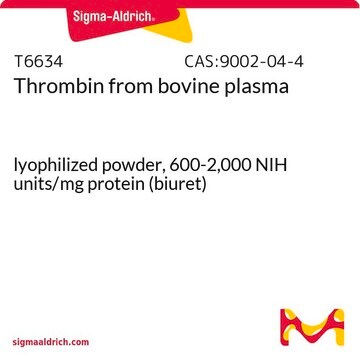W3513
Eau
HPLC grade, suitable for HPLC
Synonyme(s) :
H2O
About This Item
Produits recommandés
product name
Eau, BioPerformance Certified
Qualité
BioPerformance Certified
Densité de vapeur
<1 (vs air)
Pression de vapeur
3 mmHg
Stérilité
sterile-filtered
Forme
liquid
Technique(s)
cell culture | mammalian: suitable
Indice de réfraction
n20/D 1.34 (lit.)
pH
5-7
Point d'ébullition
100 °C (lit.)
Pf
0 °C (lit.)
Densité
1.000 g/mL at 3.98 °C (lit.)
Absorption
≤0.05 at 290
Activité étrangère
DNase, RNase, none detected
Chaîne SMILES
O
InChI
1S/H2O/h1H2
Clé InChI
XLYOFNOQVPJJNP-UHFFFAOYSA-N
Vous recherchez des produits similaires ? Visite Guide de comparaison des produits
Application
- as a component of the reaction mixture for polymerase chain reaction (PCR)
- in the dilution of plasmids for real-time PCR
- as a component of 1X TE buffer and library elution buffer (LEB)
Notes préparatoires
Autres remarques
Code de la classe de stockage
12 - Non Combustible Liquids
Classe de danger pour l'eau (WGK)
nwg
Point d'éclair (°F)
No data available
Point d'éclair (°C)
No data available
Équipement de protection individuelle
Eyeshields, Gloves
Certificats d'analyse (COA)
Recherchez un Certificats d'analyse (COA) en saisissant le numéro de lot du produit. Les numéros de lot figurent sur l'étiquette du produit après les mots "Lot" ou "Batch".
Déjà en possession de ce produit ?
Retrouvez la documentation relative aux produits que vous avez récemment achetés dans la Bibliothèque de documents.
Les clients ont également consulté
Protocoles
3-D Culture Matrix™ Collagen I facilitates cellular growth and differentiation in vitro, offering versatile applications in biomedical research.
Notre équipe de scientifiques dispose d'une expérience dans tous les secteurs de la recherche, notamment en sciences de la vie, science des matériaux, synthèse chimique, chromatographie, analyse et dans de nombreux autres domaines..
Contacter notre Service technique


